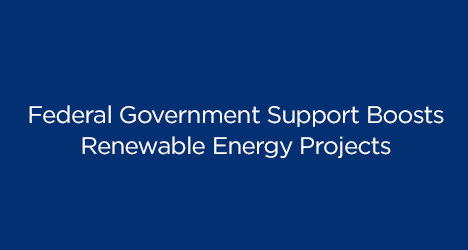Working with EPCs — End-to-End Renewable Energy Engineering Learn More
Federal Government Support Boosts Renewable Energy Projects

The Biden administration took several actions in its earliest days to promote renewable energy and to fight climate change. These actions reverse some of the policies of the prior administration. The actions also amplify the impact of tax credits in stimulus legislation that passed in late 2020.
Blymyer Engineers is already seeing the influence of the Biden administration’s actions on workload. We have many new projects on the horizon and are seeing an increase in contacts from potential clients. Recent federal actions that promote renewable energy include:
Investment Tax Credit (ITC) extension: The solar ITC was originally enacted in 2006. It provides a tax credit of 26% of the cost of solar systems, covering everything from small rooftop systems to utility-scale solar farms. The credit was set to decrease to 22% for projects initiated in 2021. Stimulus legislation extended the 26% credit to cover projects through 2022. Similar tax credits also exist for wind projects.
Rejoining the Paris Agreement: On his first day in office, Biden pledged to rejoin the Paris Agreement to slow global warming. The US rejoined the Paris Agreement in February. As part of that effort, the US will take actions to reduce carbon emissions. These actions should include elements that promote the use of renewable energy.
EV and other purchases: Biden also directed the federal government to shift towards purchases that favor renewable energy and that reduce carbon emissions. For example, the federal government will add more electric vehicles (EVs) to its vast fleet. The plan goes well beyond EVs, with the federal government planning to ramp up its purchases of renewable energy. Both actions will strengthen the already growing market for renewable energy and EVs (and by extension the EV charging stations that Blymyer designs).
Investing in innovation: Biden’s Department of Energy is reviving a program that promotes renewable energy innovation and initiatives with loans. The program has about $40 billion to work with to support cleaner energy. A smaller program seeks to foster innovation by funding cutting-edge research into new technologies. It’s the kind of research that could lead to breakthroughs in battery, solar, and wind technologies.
“The importance of renewable energy increased from 2016 to 2020 despite limited federal support,” says Blymyer President Mike Rantz. “We’re seeing more backing for renewables from Biden, and that’s likely to accelerate the shift. There are many early signals that renewable energy will be an ongoing priority for the Biden administration.”